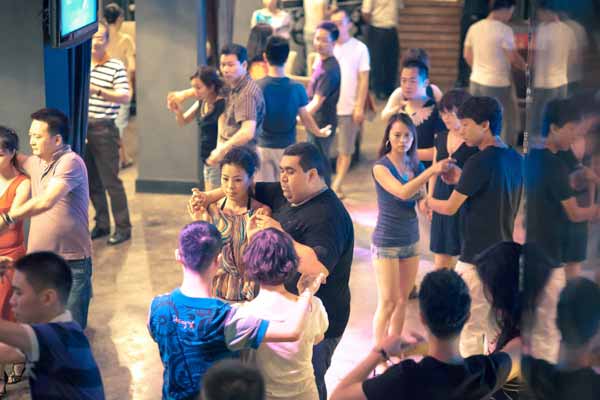Salsa fever hits Chongqing
 |
|
Salsa dancing quickly becomes a new way of socializing in Chongqing. Photos provided to China Daily |
 |
|
Salsa dancing is gaining popularity and attracting both urban youths and white-collar professionals in Chongqing. |
Evenings at the squares of Southwest China's Chongqing municipality seem to be made for dancing.
From bustling shopping centers to boisterous parks, groups of residents in Chongqing routinely shake their hips in pairs or groups in a popular local style known as baba.
But in nightclubs and bars, a more exotic style of dancing is gaining ground, attracting both urban youths and white-collar professionals - the Afro-Cuban style known as salsa.
"Salsa is growing well beyond our expectations," says Wang Jingxi, founder of a salsa club in Chongqing.
Salsa has come relatively late to the municipality compared with major cities such as Beijing and Shanghai. The first salsa club in the municipality was founded in July 2011, although people have been enjoying the form of dance in Beijing and Shanghai for nearly a decade.
But in this city where residents, old and young, like to boogie, salsa has quickly caught on since last year. Dozens of salsa clubs have been organized since then.
"The enthusiasm and passion displayed for salsa seem to fit naturally with the characters of Chongqing people," Wang says.
Wang's club has three regular sessions of salsa dancing each week. She says people have been flocking to register for her club after a number of reports from the local media.
The origins of salsa in Chongqing started to take shape in 2008 when Hong Kong engineer Thomson Leung organized salsa parties.
"There were only four or five people attending the parties at that time," Wang recalls. Wang and her friends were the first group of participants who later would become tutors at the salsa club.
After Leung left, Wang says she was addicted to salsa.
"There were no salsa classes in Chongqing at that time," Wang says. "But I was eager to learn and would fly to other cities for training lessons."
Wang says her enthusiasm for the style of dance is quickly spreading to other Chongqing residents, many of whom are looking for salsa tutors.
Zhang Siyu, a salsa tutor at the club, says he often dances all afternoon or all night in his dance classes.
Zhang, a businessman, says he now devotes almost half of his spare time to teaching at the salsa club.
"There are more women than men," Zhang says. "Usually in our parties the men barely take a break."
Zhang says he first knew of salsa while studying in Canada. He picked up salsa lessons in Beijing in the early 2000s. He believes salsa's popularity in Chongqing and in other cities has to do with the fact that people are looking for new ways to relax from their frenetic urban lives.
"Salsa is a very good way of releasing pressure," he says. "Besides it offers a new way of socializing for people in Chongqing, who usually socialize on dinner tables."
The style of dance is also easy to learn, Wang says.
"Quite different from other Latin dances or ballroom dancing, in salsa the most important thing to keep in mind is to enjoy it."
Wang says Chinese beginners tend to concentrate on making sure they dance correctly.
Sha Qing, a 34-year-old office worker in Chongqing who is also a lover of music, says salsa is an indispensable part of her life.
"Salsa is casual in style and easy to pick up. The only thing that it requires is musicality and the mastering of basic steps," she says.
She says she attends lessons once a week to keep her body in good shape.
"It was a good way to burn off fat in my body while enjoying my passion for dancing salsa," she says.
xuwei@chinadaily.com.cn














